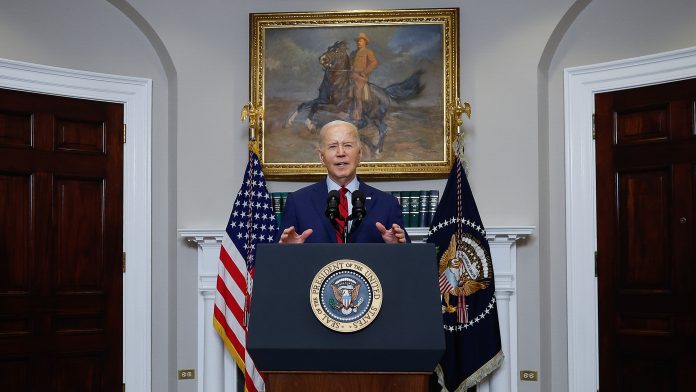For the past couple of weeks, the vortex of campus politics has threatened to suck Joe Biden in. Protesters at colleges have dubbed the president “Genocide Joe” and demanded that he act to stop Israeli actions in Gaza, while conservatives have sought to blame Biden for disorder at colleges and universities. Even as other Democrats grew nervous about the political ramifications of the protests for the upcoming election, the White House tried to stay out of it, seeing the protests as a distraction. The president has seemed, if not exactly sympathetic to the protesters, not interested in castigating them or really having anything to do with the protests at all.
Today, Biden’s patience ran out. In brief remarks at the White House, he affirmed the importance of free speech but mostly seemed intent on delivering a message of law and order.
“We’ve all seen images, and they put to the test two fundamental American principles. The first is the right to free speech and for people to peacefully assemble and make their voices heard. The second is the rule of law. Both must be upheld. We are not an authoritarian nation where we silence people or squash dissent,” Biden said. “But,” he went on, pausing, “neither are we a lawless country. We’re a civil society and order must prevail.”
In doing so, Biden accepted the conservative framing of the protests as fundamentally a problem of discipline. Protesters and their defenders have argued that, despite the fevered tone of some coverage, the demonstrations have largely been without real violence (at least until police arrived). Biden’s remarks indicate that he has become worried that the sense of disorder is catching with the public and thus becoming a liability. Chaos in the streets—real, imagined, or exaggerated—is never to an incumbent’s advantage.
To see the risks, Biden needs only look back four years ago, when Donald Trump’s standing was hurt by massive protests over police violence. Although Biden now finds himself in the same role, advocating for law and order, he does it in a much more conciliatory way. “Throughout our history, we’ve often faced moments like this, because we are a big, diverse, freethinking and freedom-loving nation,” he said. He also said there is no place for anti-Semitism or racism, and said he did not support deploying the National Guard to police protests.
Even in a short speech, however, the tensions within Biden’s approach were apparent. As he accused opportunists of turning up tensions, he said that “this is not a moment for politics,” a Strangelovian paradox when discussing, you know, political protests. He also tried to draw a line between peaceful protest and violent protest, but ended up eliding the difference. Vandalism is violence; disrupting graduation ceremonies, another example he cited, is not.
Biden may have picked his timing well. By speaking now, he doesn’t take responsibility for the sweeps by police that have already occurred. Because classes will soon end at colleges, the protests are likely to peter out, and he can try to claim credit for that. A slow release is probably Biden’s best hope here.

















